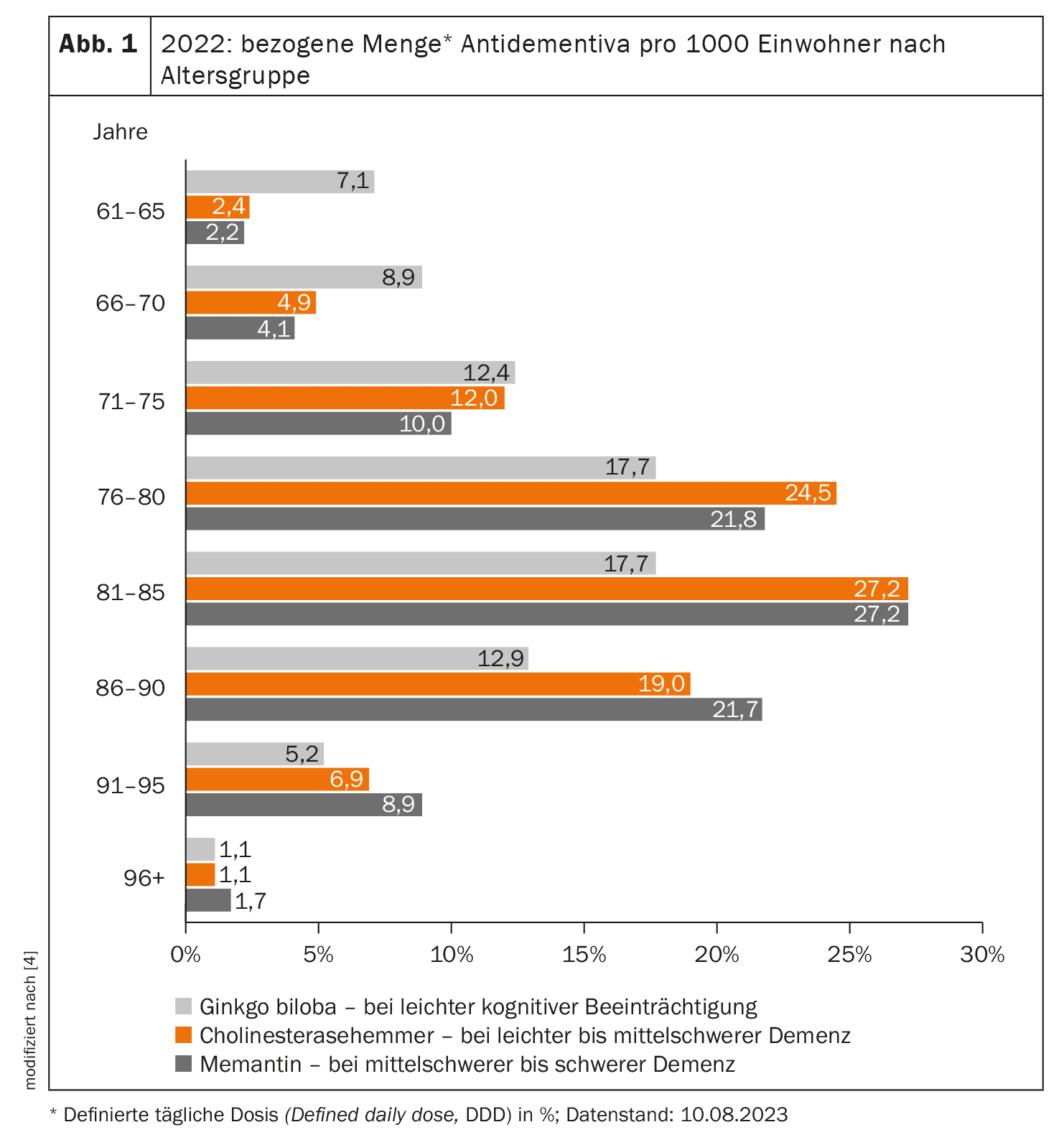The proportion of anti-dementia drugs used varies according to age. While ginkgo biloba predominates up to the age of 70, cholinesterase inhibitors and memantine are used comparatively more from the age of 76. One trend that emerged in all age groups in the 2016-2022 observation period was an increasing demand for Ginkgo biloba.
The number of people with dementia in Switzerland is estimated to be 153,000 by 2023 and is set to rise due to demographic trends [1]. Anti-dementia drugs are primarily used to stabilize the cognitive symptoms of dementia and the impairment of everyday activities [2,3]. They have also been shown to be partially effective in the treatment of behavioral and psychological symptoms of dementia (BPSD). BPSD is common and can include depression, agitation, aggression, sleep disturbances, delusions, hallucinations, anxiety or apathy.
The following substances are currently subsumed under anti-dementia drugs [4]:
- Ginkgo biloba is used for mild cognitive impairment (MCI) and incipient dementia (off-label). In addition to the indications mentioned, Ginkgo biloba is also effective for dizziness, tinnitus and peripheral arterial occlusive disease (PAOD).
- The cholinesterase inhibitors donepezil, rivastigmine and galantamine are prescribed for mild to moderate dementia.
- Memantine is reserved for cases of moderate to severe dementia.
According to the Obsan report commissioned by the National Dementia Platform (Federal Office of Public Health FOPH) and accompanied by a group of experts, older people take more anti-dementia drugs than younger people, as expected [4]. The use of the various anti-dementia drugs is distributed differently across the age groups (Fig. 1): up to and including the 66-70 age group, mainly Ginkgo biloba is used. In the 71- to 75-year-olds, it is relatively balanced and from around 76 years of age, cholinesterase inhibitors and memantine predominate. This distribution remained fairly stable over the years observed (2016-2022). The health insurance data analyzed also shows that during this observation period, an increase of +34.4% and +37.1% was recorded for Ginkgo biloba among 61- to 70-year-olds and ≥80-year-olds, while a decrease was observed for choliesterase inhibitors and memantine.
Broken down by outpatient vs. inpatient setting, the situation is as follows: in the outpatient sector, the volume of Ginkgo biloba increased by 32.6%. In contrast, cholinesterase inhibitors (-11.9%) and memantine (-10.1%) are used significantly less than at the beginning of the observation period. In nursing homes, Ginkgo biloba accounts for just under a third of prescribed anti-dementia drugs. One possible explanation for the increasing use of Ginkgo biloba is its prophylactic benefit and its applicability for subjective disorders. The analyses included medication purchases via compulsory health insurance (OKP). For example, EGb 761® (Tebokan®) is a special Ginkgo biloba extract for the symptomatic treatment of loss of mental performance, vertigo, tinnitus and PAD that is approved by health insurance companies [5].
Literature:
1. “Annual review 2023: Together for a good life with dementia”, www.alzheimer-schweiz.ch,(last accessed 20.11.2024).
2 Baskys A, Cheng JX: Pharmacological prevention and treatment of vascular dementia: Approaches and perspectives. Exp Gerontol 2012; 47: 887-891.
3. “Dementia: Diagnosis, treatment and care”, www.alzheimer-schweiz.ch/fileadmin/dam/Alzheimer_Schweiz/Dokumente/Publikationen-Produkte/159_D_Diagnose_2018_web.pdf,(last accessed 20.11.2024).
4. “Psychopharmaceuticals in dementia treatment”, www.obsan.admin.ch/sites/default/files/2024-06/obsan_bulletin_2024_01_d.pdf,(last accessed 20.11.2024).
5. technical information Tebokan®; https://www.swissmedicinfo.ch; status: April 2022.
InFo NEUROLOGY & PSYCHIATRY 2024; 22(6): 36
HAUSARZT PRAXIS 2024; 19(12): 28












